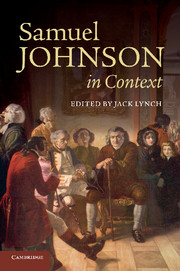Book contents
- Frontmatter
- Contents
- Illustrations
- Contributors
- Preface
- Chronology
- Abbreviations
- Part I Life and works
- Part II Critical fortunes
- Part III Contexts
- Chapter 10 America
- Chapter 11 Anglicanism
- Chapter 12 Anthropology
- Chapter 13 Authorship
- Chapter 14 Biography
- Chapter 15 Book trade
- Chapter 16 Clubs
- Chapter 17 Conversation
- Chapter 18 Dictionaries
- Chapter 19 Domestic life
- Chapter 20 Education
- Chapter 21 Empire
- Chapter 22 Essays
- Chapter 23 Fiction
- Chapter 24 History
- Chapter 25 Journalism
- Chapter 26 Law
- Chapter 27 Literary criticism
- Chapter 28 London
- Chapter 29 Medicine
- Chapter 30 Mental health
- Chapter 31 Money
- Chapter 32 Nationalism
- Chapter 33 Philosophy
- Chapter 34 Poetry
- Chapter 35 Politics
- Chapter 36 Scholarship
- Chapter 37 Science and technology
- Chapter 38 Scotland
- Chapter 39 Sermons
- Chapter 40 Shakespeare
- Chapter 41 Slavery and abolition
- Chapter 42 Social hierarchy
- Chapter 43 Theatre
- Chapter 44 Travel
- Chapter 45 Visual arts
- Chapter 46 War
- Chapter 47 Women writers
- Further reading
- Index
- References
Chapter 42 - Social hierarchy
from Part III - Contexts
Published online by Cambridge University Press: 05 June 2012
- Frontmatter
- Contents
- Illustrations
- Contributors
- Preface
- Chronology
- Abbreviations
- Part I Life and works
- Part II Critical fortunes
- Part III Contexts
- Chapter 10 America
- Chapter 11 Anglicanism
- Chapter 12 Anthropology
- Chapter 13 Authorship
- Chapter 14 Biography
- Chapter 15 Book trade
- Chapter 16 Clubs
- Chapter 17 Conversation
- Chapter 18 Dictionaries
- Chapter 19 Domestic life
- Chapter 20 Education
- Chapter 21 Empire
- Chapter 22 Essays
- Chapter 23 Fiction
- Chapter 24 History
- Chapter 25 Journalism
- Chapter 26 Law
- Chapter 27 Literary criticism
- Chapter 28 London
- Chapter 29 Medicine
- Chapter 30 Mental health
- Chapter 31 Money
- Chapter 32 Nationalism
- Chapter 33 Philosophy
- Chapter 34 Poetry
- Chapter 35 Politics
- Chapter 36 Scholarship
- Chapter 37 Science and technology
- Chapter 38 Scotland
- Chapter 39 Sermons
- Chapter 40 Shakespeare
- Chapter 41 Slavery and abolition
- Chapter 42 Social hierarchy
- Chapter 43 Theatre
- Chapter 44 Travel
- Chapter 45 Visual arts
- Chapter 46 War
- Chapter 47 Women writers
- Further reading
- Index
- References
Summary
Rank. n.s. [rang, Fr.]
4. Class; order.
The enchanting power of prosperity over private persons is remarkable in relation to great kingdoms, where all ranks and orders of men, being equally concerned in publick blessings, equally join in spreading the infection. Atterbury.
The enormous changes that occurred in the British social hierarchy during the eighteenth century may be illustrated by the example of Johnson himself: he was the son of a failed Lichfield bookseller who came to London in 1737 with very little money and without any connections with the nobility or with the wealthy. By the end of his life, he was a revered public figure who counted people of great wealth and eminence among his personal acquaintance. Such a rise from poverty to fame was almost unknown a century before, except in a few cases when talented people attracted the regard of rich patrons. Johnson, on the contrary, famously spurned the vaunted “patronage” of the powerful Lord Chesterfield, making a virtue of his isolation from the court and “polite” circles. What had happened in Britain to make such a rise possible – not only for Johnson, but for many low-born writers, public figures, and men of business?
Backgrounds
Particularly after the Glorious Revolution of 1688, Britain began to make great strides towards being a modern capitalist nation. The traditional aristocracy and the great landowners continued to wield political power, but their ascendancy was increasingly challenged and limited by self-made merchants, tradesmen, and bankers. This change resulted partly from Britain’s widening domination of international trade by virtue of its well-organized chartered companies, its large and efficient navy, and its coloniesin America and the Caribbean, as well as its commercial outposts in India (see chapter 21, “Empire”). Britain had the world’s greatest banking system, centered on Bank of England, founded in 1694, providing an almost unlimited source of funds for investment and for the creation of a formidable war machine to protect the nation’s interests. The aristocracy itself did not remain an insular, distant class, as it did in France and other European nations; instead it actively involved itself in trade and commerce, becoming deeply indebted to financiers in the City of London. Led by this commercialized elite, agriculture became highly competitive and commercial, as farms became larger and more efficient, and land was mined for coal to fire factories and manufactures. The “Industrial Revolution” had really begun long before the 1780s, where it is usually placed.
- Type
- Chapter
- Information
- Samuel Johnson in Context , pp. 360 - 366Publisher: Cambridge University PressPrint publication year: 2011
References
- 1
- Cited by



